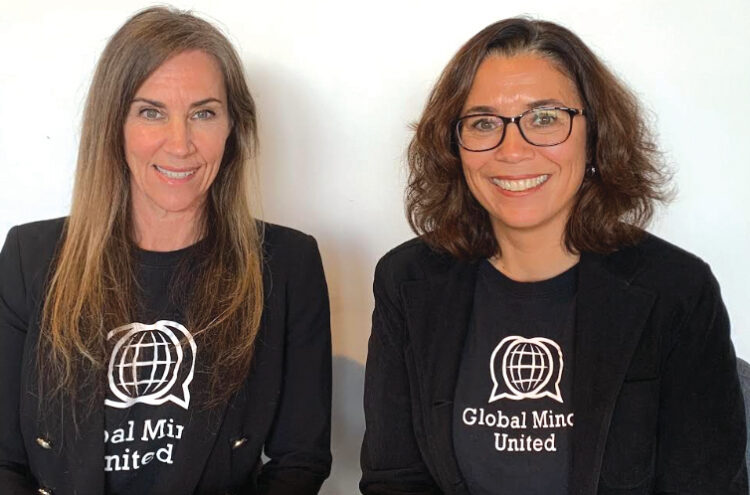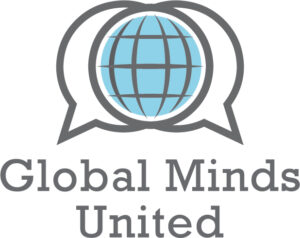Teaching self-awareness for a better world

Ridgely Chapman, left, president and founder of Global Minds United, and Dawne Kakitsis, director of marketing and outreach, team up to help teens become self-aware and how to work with others to build a community for themselves.
Jan. 25. By TL Bernthal. A child is not born a self-aware global citizen. Teens don’t necessarily understand themselves, let alone how they fit in an inclusive, diverse world.
But they can learn. And that’s the mission of the local non-profit Global Minds United.
Ridgely Chapman founded Global Minds United in 2019 on the premise that before people can make external change to create equality and fulfill the United Nations Sustainable Development Goals, they must engage in a psychological understanding of themselves and others.
Two years earlier, she heard someone speak about a study that found 7 of 10 people would not have friends of a different political party.
She remembers thinking “oh, we have to change that.” First an individual has to learn who they are, how to get along with others, and then how to work together globally.

Right now, the focus is on working with high-schoolers, with school programs at Hough High, for example, and summer summits to bring together rising ninth- through 12th-graders.
Dawne Kakitsis of Cornelius, whose background is in education, joined Chapman early on as director of marketing and outreach for Global Minds United. She also serves on the board for Unity in Community (UiC).
Chapman and Kakitsis have children the same age and knew each other from when their children attended Davidson United Methodist Church pre-school. Their lives crossed paths again years later at an Ada Jenkins fundraiser and they found they had similar passions for ending racism and bigotry, even before it was on the national radar with the police officer killing of George Floyd, the Black Lives Matter movement and at the polarization of the Trump presidency.
What it’s about
The mission statement: “Our Mission is to provide a multifaceted educational platform to schools, promoting diversity and inclusion to develop competent, compassionate and active global citizens.”
One of the stumbling blocks for teenagers is a fear of being their authentic self, Kakitsis says, “when it’s so easy to craft an identity acceptable to everyone.”
A starting point is to admit to the uncertainty of how to relate to parents, friends and peers, she says.
Questioning is healthy for teens, says Chapman, psychologist. She is currently working with the Harvard Graduate School of Education to create and spread global education to students and teachers in the United States and around the world.
Some parents, especially when they hear words like diversity and inclusiveness, think the Global Minds United program has some sort of indoctrination that is being promoted, Chapman says.
Not true, she says. The goal is self-awareness so there can be belonging. The programs are not to change anyone, but also to not create a sense of shame or guilt, Chapman says.
What’s next
The hope is have workshops for adults in 2024 so teachers in schools that don’t partner with Global Minds United can learn along with corporate and business staffs. Global Minds United also hopes to add get-togethers for the students and their parents after the summer summit.
Kakitsis says the social summits would allow the teens to meet quarterly “so kids can inspire each other.”
Measures of success
As a non-profit, Global Minds United is asked to measure its success by numbers when applying for grants or funding. The funding goal for 2023 is $180,000.
But Chapman points out that the success is not measured in numbers, but in the stories of brave acts.
For example:
• Near the end of the one-day summer summit, one teen stood up and told the group that a month
earlier, they didn’t want to be here, as in didn’t want to live anymore. But after spending the day with peers, the teen said they now felt that they belonged to a community.
• A Hough High senior left the summit and spent hours talking to his mom. The next day, he took steps to create a Young Men’s Mental Health Club at Hough in response to three male suicides within 18 months. The club is still active.
Charlotte Mecklenburg schools paid a portion of the fee for the program at Hough and two grants from The Peninsula Foundation paid the remainder. At Hough, the program cost $17,000 a year for the workshops and consulting.
Other successes in 2022 include:
• Completed a two-year partnership with Hough High serving 180 teachers and administrators, 2,000 students and 2,000 student families
• Created a micro-aggression awareness workshop serving 2,800 students from several area high schools
• Inspired compassion and action with ThinkAct Summer Summit 2022 serving 65 students and 25 community guest speakers and volunteers.
Chapman says she is developing a partnership with Woodlawn School in Mooresville, and next year’s ThinkAct Summer Summit will be held there July 27.
Students can apply for a spot at the summit on the Global Minds United website. The organization seeks sponsorships so no one has to pay to attend. Giving opportunities can be found on the website as well.
One Comment
Comments are closed.





These women are on to something big! This is so up lifting and encouraging. I am a grandmother to four teens and a tween. I am going to pass this information for sure to my daughter in Harrisburg here in NC. One of her boys is a rising high school freshman. I hope these wonderful ladies have reached out to Hickory Ridge HS in Harrisburg with implementation of a program there. I would love for my grandson to be able to attend a summer summit. Thank you so much for a positive start to my day.